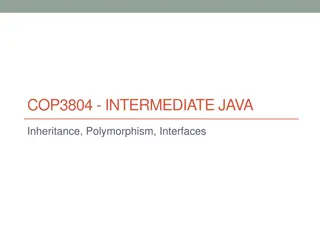Dissecting the Inline Keyword in Kotlin: Need and Achievements
Delve into the necessity of the inline keyword in Kotlin, exploring its role in arranging code efficiently. Understand how Kotlin achieves inlining through lambdas and closures, enhancing code performance and readability in the process.
Download Presentation

Please find below an Image/Link to download the presentation.
The content on the website is provided AS IS for your information and personal use only. It may not be sold, licensed, or shared on other websites without obtaining consent from the author.If you encounter any issues during the download, it is possible that the publisher has removed the file from their server.
You are allowed to download the files provided on this website for personal or commercial use, subject to the condition that they are used lawfully. All files are the property of their respective owners.
The content on the website is provided AS IS for your information and personal use only. It may not be sold, licensed, or shared on other websites without obtaining consent from the author.
E N D
Presentation Transcript
Dissecting the inline keyword in Kotlin Suraj Shah, Software Engineer, Quiph
About me: Contributor to Firefox Fenix, Mongo Stitch SDK, Realm etc. Kotlin, Java, GoLang Android, backend Photography, travelling and trekking Links: 1. Twitter: @shahsurajk 2. Github: /shahsurajk 3. Email: shahsurajk@gmail.com 4. Instagram: @a_random_traveller
QTalk: making phone calls fun & stress-free QTalk delivers synchronous communication with features like shared web browsing, games, doodle without leaving the call screen Kotlin client and backend Default dialer on Android Links: 1. Twitter: @getQTalkApp 2. Instagram: /QTalkApp 3. Facebook: /QTalkApp 4. Website: qtalk.io
Inline keyword 1. Why do we need it?
Why do we need it? Definition: Arranging things in a line Why does Kotlin need to have a special keyword for this? Why can t the compiler automatically do it? Role of Java versions here?
Java version compatibility? Lambdas? Lambdas in Java? Java 7 and invokedynamic bytecode instruction Compatibility and tools like retrolambda How does it affect Kotlin? Why should we care? Java 6 and Android?
Inline keyword 2. How does Kotlin achieve it?
How? 1. Lambdas and closures
1. Lambdas and closures Kotlin Lambdas: family of function types? Kotlin functions are first-class. Closures: a value captured by a lambda belonging to its outer scope
1. Lambdas and closures fun testLambdas(index: Int, myLambda: (index: Int) -> Unit){ myLambda.invoke(index+1) } fun myBigLoop(){ val valueInClosure = "Why!" (0 .. 50).forEach { testLambdas(it) { lambdaValue-> println("$valueInClosure $lambdaValue") } } }
1. Lambdas and closures fun testLambdas(index: Int, myLambda: (index: Int) -> Unit){ myLambda.invoke(index+1) } fun myBigLoop(){ val valueInClosure = "Why!" (0 .. 50).forEach { testLambdas(it) { lambdaValue-> println("$valueInClosure $lambdaValue") } } }
1. Lambdas and closures fun testLambdas(index: Int, myLambda: (index: Int) -> Unit){ myLambda.invoke(index+1) } fun myBigLoop(){ val valueInClosure = "Why!" (0 .. 50).forEach { testLambdas(it) { lambdaValue-> println("$valueInClosure $lambdaValue") } } }
How? 2. Call Sites
fun iAmGroot() { println("I am Groot!") } class WhoAmI { fun printMe() { iAmGroot() // call site } }
fun iAmGroot() { println("I am Groot!") } class WhoAmI { fun printMe() { iAmGroot() // call site } }
How? 3. Non-inlined lambdas
fun testLambdas( index: Int, myLambda: (index: Int) -> Unit ){ myLambda.invoke(index+1) } fun myBigLoop(){ val valueInClosure = "Why!" (0 .. 50).forEach { testLambdas(it) { lambdaValue-> println("$valueInClosure $lambdaValue") } } }
fun testLambdas( index: Int, myLambda: (index: Int) -> Unit ){ myLambda.invoke(index+1) } fun myBigLoop(){ val valueInClosure = "Why!" (0 .. 50).forEach { testLambdas(it) { lambdaValue-> println("$valueInClosure $lambdaValue") } } }
fun testLambdas( index: Int, myLambda: (index: Int) -> Unit ){ myLambda.invoke(index+1) } fun myBigLoop(){ val valueInClosure = "Why!" (0 .. 50).forEach { testLambdas(it) { lambdaValue-> println("$valueInClosure $lambdaValue") } } }
Decompiled code for the lambda: final class InlineFunctionsKt$myBigLoop$$inlined$forEach$lambda$1 extends Lambda implements Function1 { // $FF: synthetic field final String $valueInClosure$inlined; InlineFunctionsKt$myBigLoop$$inlined$forEach$lambda$1(String var1) { super(1); this.$valueInClosure$inlined = var1; } // $FF: synthetic method // $FF: bridge method public Object invoke(Object var1) { this.invoke(((Number)var1).intValue()); return Unit.INSTANCE; } public final void invoke(int lambdaValue) { String var2 = this.$valueInClosure$inlined + ' ' + lambdaValue; boolean var3 = false; System.out.println(var2); } }
Decompiled code for the lambda: final class InlineFunctionsKt$myBigLoop$$inlined$forEach$lambda$1 extends Lambda implements Function1 { // $FF: synthetic field final String $valueInClosure$inlined; InlineFunctionsKt$myBigLoop$$inlined$forEach$lambda$1(String var1) { super(1); this.$valueInClosure$inlined = var1; } // $FF: synthetic method // $FF: bridge method public Object invoke(Object var1) { this.invoke(((Number)var1).intValue()); return Unit.INSTANCE; } public final void invoke(int lambdaValue) { String var2 = this.$valueInClosure$inlined + ' ' + lambdaValue; boolean var3 = false; System.out.println(var2); } }
Decompiled code for the lambda: final class InlineFunctionsKt$myBigLoop$$inlined$forEach$lambda$1 extends Lambda implements Function1 { // $FF: synthetic field final String $valueInClosure$inlined; InlineFunctionsKt$myBigLoop$$inlined$forEach$lambda$1(String var1) { super(1); this.$valueInClosure$inlined = var1; } // $FF: synthetic method // $FF: bridge method public Object invoke(Object var1) { this.invoke(((Number)var1).intValue()); return Unit.INSTANCE; } public final void invoke(int lambdaValue) { String var2 = this.$valueInClosure$inlined + ' ' + lambdaValue; boolean var3 = false; System.out.println(var2); } }
Decompiled code, call site: public static final void myBigLoop() { String valueInClosure = "Why!"; byte var1 = 0; Iterable $this$forEach$iv = (Iterable)(new IntRange(var1, 50)); int $i$f$forEach = false; Iterator var3 = $this$forEach$iv.iterator(); while(var3.hasNext()) { int element$iv = ((IntIterator)var3).nextInt(); int var6 = false; testLambdas( element$iv, (Function1)(new InlineFunctionsKt$myBigLoop$$inlined$forEach$lambda$1(valueInClosure)) ); } }
Decompiled code, call site: public static final void myBigLoop() { String valueInClosure = "Why!"; byte var1 = 0; Iterable $this$forEach$iv = (Iterable)(new IntRange(var1, 50)); int $i$f$forEach = false; Iterator var3 = $this$forEach$iv.iterator(); while(var3.hasNext()) { int element$iv = ((IntIterator)var3).nextInt(); int var6 = false; testLambdas( element$iv, (Function1)(new InlineFunctionsKt$myBigLoop$$inlined$forEach$lambda$1(valueInClosure)) ); } }
Decompiled code, call site: public static final void myBigLoop() { String valueInClosure = "Why!"; byte var1 = 0; Iterable $this$forEach$iv = (Iterable)(new IntRange(var1, 50)); int $i$f$forEach = false; Iterator var3 = $this$forEach$iv.iterator(); while(var3.hasNext()) { int element$iv = ((IntIterator)var3).nextInt(); int var6 = false; testLambdas( element$iv, (Function1)(new InlineFunctionsKt$myBigLoop$$inlined$forEach$lambda$1(valueInClosure)) ); } }
Decompiled code, call site: public static final void myBigLoop() { String valueInClosure = "Why!"; byte var1 = 0; Iterable $this$forEach$iv = (Iterable)(new IntRange(var1, 50)); int $i$f$forEach = false; Iterator var3 = $this$forEach$iv.iterator(); while(var3.hasNext()) { int element$iv = ((IntIterator)var3).nextInt(); int var6 = false; testLambdas( element$iv, (Function1)(new InlineFunctionsKt$myBigLoop$$inlined$forEach$lambda$1(valueInClosure)) ); } }
Non-inlined lambdas without closure? For non-inline lambdas without closure, a singleton is created rather than new object creation on every invocation
Non-inlined lambdas without closure? fun testLambdas(index: Int, myLambda: (index: Int) -> Unit){ myLambda.invoke(index+1) } fun myBigLoop(){ (0 .. 50).forEach { testLambdas(it) { lambdaValue-> println("$lambdaValue") } } }
Non-inlined lambdas without closure? fun testLambdas(index: Int, myLambda: (index: Int) -> Unit){ myLambda.invoke(index+1) } fun myBigLoop(){ (0 .. 50).forEach { testLambdas(it) { lambdaValue-> println("$lambdaValue") } } }
Non-inlined lambdas without closure? Decompiled code, call site: public static final void myBigLoop() { byte var0 = 0; Iterable $this$forEach$iv = (Iterable)(new IntRange(var0, 50)); int $i$f$forEach = false; Iterator var2 = $this$forEach$iv.iterator(); while(var2.hasNext()) { int element$iv = ((IntIterator)var2).nextInt(); int var5 = false; testLambdas(element$iv, (Function1)InlineFunctionsKt$myBigLoop$1$1.INSTANCE); } }
Non-inlined lambdas without closure? Decompiled code, call site: public static final void myBigLoop() { byte var0 = 0; Iterable $this$forEach$iv = (Iterable)(new IntRange(var0, 50)); int $i$f$forEach = false; Iterator var2 = $this$forEach$iv.iterator(); while(var2.hasNext()) { int element$iv = ((IntIterator)var2).nextInt(); int var5 = false; testLambdas(element$iv, (Function1)InlineFunctionsKt$myBigLoop$1$1.INSTANCE); } }
How? 4. Inlined lambdas
fun testLambdas( index: Int, myLambda: (index: Int) -> Unit ){ myLambda.invoke(index+1) } fun myBigLoop(){ val valueInClosure = "Why!" (0 .. 50).forEach { testLambdas(it) { lambdaValue-> println("$valueInClosure $lambdaValue") } } }
inline fun testLambdas( index: Int, myLambda: (index: Int) -> Unit ){ myLambda.invoke(index+1) } fun myBigLoop(){ val valueInClosure = "Why!" (0 .. 50).forEach { testLambdas(it) { lambdaValue-> println("$valueInClosure $lambdaValue") } } }
Decompiled code, not only of the lambda, but both: public static final void testLambdas(int index, @NotNull Function1 myLambda) { int $i$f$testLambdas = 0; Intrinsics.checkParameterIsNotNull(myLambda, "myLambda"); myLambda.invoke(index + 1); } public static final void myBigLoop() { String valueInClosure = "Why!"; byte var1 = 0; Iterable $this$forEach$iv = (Iterable)(new IntRange(var1, 50)); int $i$f$forEach = false; Iterator var3 = $this$forEach$iv.iterator(); while(var3.hasNext()) { int element$iv = ((IntIterator)var3).nextInt(); int var6 = false; int $i$f$testLambdas = false; int lambdaValue = element$iv + 1; int var9 = false; String var10 = valueInClosure + ' ' + lambdaValue; boolean var11 = false; System.out.println(var10); } }
Decompiled code, not only of the lambda, but both: public static final void testLambdas(int index, @NotNull Function1 myLambda) { int $i$f$testLambdas = 0; Intrinsics.checkParameterIsNotNull(myLambda, "myLambda"); myLambda.invoke(index + 1); } public static final void myBigLoop() { String valueInClosure = "Why!"; byte var1 = 0; Iterable $this$forEach$iv = (Iterable)(new IntRange(var1, 50)); int $i$f$forEach = false; Iterator var3 = $this$forEach$iv.iterator(); while(var3.hasNext()) { int element$iv = ((IntIterator)var3).nextInt(); int var6 = false; int $i$f$testLambdas = false; int lambdaValue = element$iv + 1; int var9 = false; String var10 = valueInClosure + ' ' + lambdaValue; boolean var11 = false; System.out.println(var10); } }
Decompiled code, not only of the lambda, but both: public static final void testLambdas(int index, @NotNull Function1 myLambda) { int $i$f$testLambdas = 0; Intrinsics.checkParameterIsNotNull(myLambda, "myLambda"); myLambda.invoke(index + 1); } public static final void myBigLoop() { String valueInClosure = "Why!"; byte var1 = 0; Iterable $this$forEach$iv = (Iterable)(new IntRange(var1, 50)); int $i$f$forEach = false; Iterator var3 = $this$forEach$iv.iterator(); while(var3.hasNext()) { int element$iv = ((IntIterator)var3).nextInt(); int var6 = false; int $i$f$testLambdas = false; int lambdaValue = element$iv + 1; int var9 = false; String var10 = valueInClosure + ' ' + lambdaValue; boolean var11 = false; System.out.println(var10); } }
Decompiled code, not only of the lambda, but both: public static final void testLambdas(int index, @NotNull Function1 myLambda) { int $i$f$testLambdas = 0; Intrinsics.checkParameterIsNotNull(myLambda, "myLambda"); myLambda.invoke(index + 1); } public static final void myBigLoop() { String valueInClosure = "Why!"; byte var1 = 0; Iterable $this$forEach$iv = (Iterable)(new IntRange(var1, 50)); int $i$f$forEach = false; Iterator var3 = $this$forEach$iv.iterator(); while(var3.hasNext()) { int element$iv = ((IntIterator)var3).nextInt(); int var6 = false; int $i$f$testLambdas = false; int lambdaValue = element$iv + 1; int var9 = false; String var10 = valueInClosure + ' ' + lambdaValue; boolean var11 = false; System.out.println(var10); } }
Real magic in action: Type reification
Reification: what? The literal meaning of the word reified is to convert into or regard as a concrete thing
Reification: context Generics
Reification: context: generics: Java, type erasure: public static void main(String[] args) { final List<String> s = new ArrayList<>(); System.out.println(s instanceof List<Object>); }
Reification: context: generics: Java, type erasure: public static void main(String[] args) { final List<String> s = new ArrayList<>(); System.out.println(s instanceof List<Object>); } Compiler error: Illegal generic type for instance of
Reification: context: generics: Java, type erasure: public static void main(String[] args) { final List<String> s = new ArrayList<>(); System.out.println(s instanceof List); } Works!
Reification: how? Can inline help?
Reification: how?: inline try? Kotlin generic type check without inline and reified: fun <T> reifiedTest(){ println(T::class.simpleName == String::class.simpleName) } reifiedTest<String>()
Reification: how?: inline try? Kotlin generic type check without inline and reified: fun <T> reifiedTest(){ println(T::class.simpleName == String::class.simpleName) } reifiedTest<String>() Compiler error: Cannot use 'T' as reified type parameter. Use a class instead.
Reification: how?: inline try? Kotlin generic type check with inline and reified: inline fun <reified T> reifiedTest(){ println(T::class.simpleName == String::class.simpleName) } reifiedTest<String>() Voila! It works!
Reification: how?: internals Test Code: inline fun <reified T> reifiedTest(){ println(T::class.simpleName == String::class.simpleName) } fun test(){ reifiedTest<String>() }





















